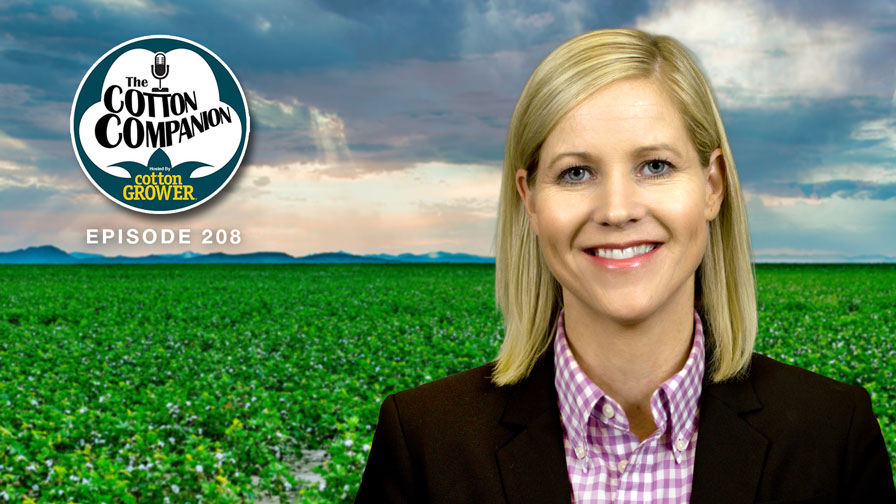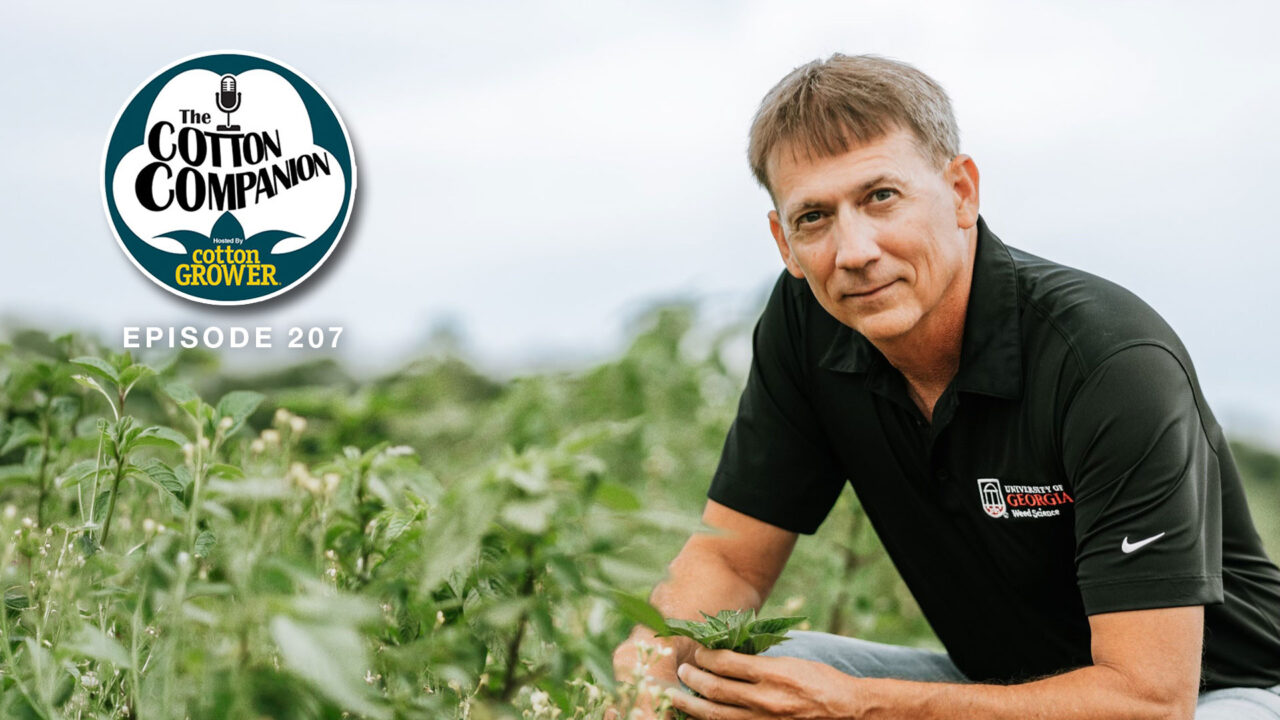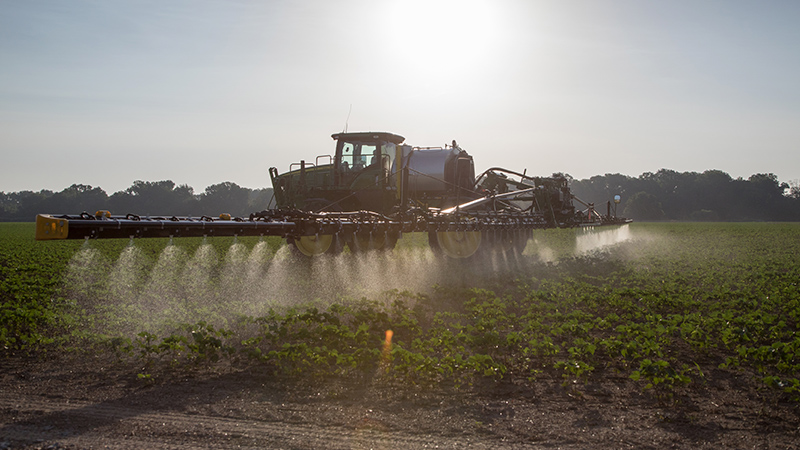Ted Schneider: 2024 Cotton Achievement Award Recipient Helps Set Cotton’s Sustainable Direction
Ted Schneider (Photo: Jim Steadman)
Sustainability is now a key component in cotton production around the world. And no more so than in the U.S., where cotton growers have multiple industry and corporate options for participation. Many dedicated people have invested many hours in developing, nurturing, and driving these programs to their current levels over the past several years.
Among all of those folks, you’ll find Ted Schneider.
Sustainability has always been a key part of Schneider’s farming operation near Lake Providence, LA. He’s been the primary caretaker of the family land for more than 40 years. And during much of that time, he’s given that same level of care and dedication to the cotton industry through his involvement in multiple leadership roles with the National Cotton Council (NCC) and several of its affiliated organizations, Cotton Incorporated, Louisiana Cotton and Grain Association, and – most recently – the U.S. Cotton Trust Protocol.
In recognition of his farming success, leadership, industry involvement, and continued drive for the importance of sustainability, Cotton Grower is honored to recognize Ted Schneider as the recipient of the 2024 Cotton Grower℠ Cotton Achievement Award.
Following the Family Tradition of Industry Service
Since 1984, Schneider has been the owner/operator of what has grown to a 6,000+-acre diversified farming operation in northeast Louisiana and southeast Arkansas, dedicated to sustainable, responsible production of cotton and grain crops. The majority of his industry involvement has come during the past decade – involvement that he says came naturally.
“I’ve actually been coming to National Cotton Council meetings since I was six years old,” he recalls. “My dad was actively involved in the Council, and he brought me and usually a brother or two with him to meetings for years. I finally figured out that he had to bring us because I had five siblings, and it allowed him to keep participating.
“Not long before he passed, he told me that he really didn’t like to farm, but he stayed in it because he loved the National Cotton Council. By the time I found out he took me just so he could come to meetings, it was too late. It was ingrained in me, and I just feel like it’s important to serve our industry the best I can.”
Schneider served as a NCC director and led multiple NCC committees, including chairmanship of the NCC’s Committee for the Advancement of Cotton and its Sustainability Task Force and Budget Committee.
In 2018 and 2019, Schneider served as president of Cotton Council International (CCI), the NCC’s export promotions arm, and was an active leader in the NCC’s American Cotton Producers. He served as NCC vice chairman in 2020 and 2021 and was NCC Chairman in 2022. He is also a past board member of Cotton Incorporated and a past president of the Louisiana Cotton and Grain Association.
Finding His Leadership Niche
Sustainability has always been an important issue for Schneider – one that evolved from his years serving Cotton Council International.
“That CCI involvement exposed me to something outside of the producer segment,” he explains. “It really highlighted the fact that we are in the supply chain of a much larger industry. The apparel industry is our customer, and they were asking us to create a sustainability protocol to help meet their goals of buying only sustainable cotton. We’re an important cog in that supply chain, and we have to meet the needs of our customers.”
Following a phone call from NCC President/CEO Gary Adams in 2017, Schneider became an important cog in the U.S. sustainability effort.
“Gary called me and said that NCC was forming a sustainability task force and asked me to be on it,” he says. “I told him it is such an interesting topic, that I was glad we were doing that, and that I would be happy to serve on it as one of the producers. Near the end of the call, he also said ‘I want you to chair it.’ So, I accepted the role, thinking it would be a simple process. It turned out to be anything but simple.”
Following several years of task force discussions and meetings, the U.S. Cotton Trust Protocol launched as a pilot project in 2020 with Schneider as its first chairman. Today, the Protocol is managed by its own staff, with membership including growers, brands and retailers, environmental groups, and NGOs – pretty much every segment of the industry that touches the cotton supply chain.
“I realized quickly that sustainability had so many moving parts, and I was happy to contribute where I could,” says Schneider. “The climate smart grant helped a lot, allowing us to start rewarding producers for their participation. That’s important, because as long as cotton keeps going on, more producers are recognizing that this is the way we can compete.
“It’s important to me because it means survival,” he says. “If I’m not sustainable and if I’m not efficient, I may not be able to continue to grow cotton. We can no longer out-produce Brazil. But sustainability gives us a competitive advantage that we need to use today.”
He’s pleased that the NCC has now formed a strategic task force to look at both short- and long-term direction on where and how the U.S. cotton industry can change and evolve in order to enhance its competitiveness with the rest of the world.
“There’s a lot of interest in this and, from what I’ve heard, a lot of good ideas came out of the first meeting,” says Schneider. “We have to be nimble, and I think this process is going to allow us to do that.”
From Gary Adams, President/CEO, National Cotton Council
“The NCC is so very proud of Ted for receiving the Cotton Achievement Award. He is such an outstanding volunteer leader both in the cotton industry and in his community. His involvement with the Council has been invaluable from his service on the ACP to his time as the Chairman and the many committees in between. Ted also is an innovator on the farm and a recognized environmental champion, serving as the first chair of the COTTON USA Sustainability Task Force which became the first U.S. Cotton Trust Protocol Board and launched the initiative. We are grateful for his many contributions to this industry.”
Looking for Technical Advantages on the Farm
Schneider started farming with his dad before assuming management of the entire farm. Today, he farms in a partnership with his son, Hall, and both of them are continually looking at new technologies to help make their farming operation more time and labor efficient.
“With 6,000 acres, it’s a bit of a stretch sometimes to make things work with just me, my son, and six or seven employees,” he admits. “I tell my son that we don’t get paid for labor, we get paid on how we manage the farm. And it’s hard to do both these days. Technology helps us increase efficiency and manage labor issues, but it also means you need someone who’s not afraid of that technology and who has the attention span and ability to diagnose and to input the right information.”
Drone technology currently has his attention, potentially as a replacement for his “worn out” sprayer.
“Two drones can cover the same amount of ground that our sprayer can,” he says. “There are a lot of times we can’t use the ground rig because conditions are too wet. We can get closer to the canopy, use a lower volume, and it does really well at a much lower investment cost. That technology keeps things interesting, for sure.”
Technology also helps offset concerns he may have about the future of cotton production.
“This year, we had about 4,500 acres of grain crops and about 1,800 acres of cotton,” recalls Schneider. “The grain and soybean harvest is like cotton was 40 years ago. If you have two combines with 12-row heads, you have to have eight trucks and drivers, two or three grain cart operators, four or five pickup trucks, and two or three tractors. And moving it all down the road is a logistical nightmare.
“Yet, I can harvest my cotton crop by myself,” he adds. “That’s one of the reasons I’m encouraged by cotton. Yields keep going up, and harvest has gotten a lot easier.”
What he’s not encouraged by these days, however, is cotton prices.
“Forty years ago, I was getting 68 cents a pound for cotton,” he says. “Today, the futures price is still 68 cents. Our yields have increased 50-75% since then, but our input costs have gone up 300%. The math is not working. I keep telling people that I’m getting really good at subtraction.”
Looking Ahead
Schneider will be the first to tell you he’s busier now than he was in his year as NCC Chairman. An expanded farm operation will do that. So will the occasional NCC obligations. And so will grandchildren and the things you do for them. For example:
“I coached our local school’s tennis team for 15 years off and on, including all three of my kids,” he says. “Now, my soon-to-be 15-year-old granddaughter started playing high school tennis at her school, and they asked me to help coach. So now I’m coaching her and a few other kids whose mothers I also coached in high school. So, I stay busy. It’s personally satisfying, as is spending tractor time with some of the other younger grandkids.”
Despite the stresses of today’s farming, Schneider still loves to farm. In many ways, it provides comfort and an acknowledgement that his farm’s sustainability efforts have paid off.
“One of the reasons I love to farm is because I can take a little time and just look at the environment I work in, and I can see God everywhere,” he says. “It’s so peaceful if you just take the time to enjoy that. It’s serenity and just being able to stop and see the beauty anywhere you look.
“When I first started farming up until about 2000, the alligator, black bear, and bald eagle were all on the endangered species list,” he notes. “Now, there’s a hunting season for black bears in Louisiana. Alligators are everywhere. And I see bald eagles almost every day if I’m looking for them.
“It’s another aspect of sustainability that we often don’t consider. And I’m so glad that we’re contributing to that.”










